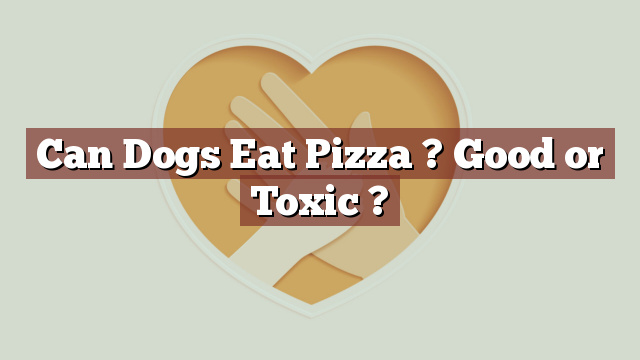Can Dogs Eat Pizza? Good or Toxic?
Dogs are known for their love of food, and as pet owners, it’s essential to be aware of what is safe for them to consume. While some human foods can be shared with our furry friends, others can be harmful or even toxic to their health. Pizza is a popular food enjoyed by many, but can dogs partake in this cheesy delight? In this article, we will explore whether dogs can eat pizza and the potential risks or benefits associated with it.
Nutritional Value of Pizza for Dogs: Is it Balanced?
Pizza is a dish that typically consists of a crust, sauce, cheese, and various toppings. Each component of pizza contributes to its nutritional value. The crust provides carbohydrates, while the sauce adds flavor and may contain vegetables. Cheese contains protein and calcium, and the toppings can vary from meats to vegetables, offering additional nutrients.
However, despite these components, pizza is not considered a balanced meal for dogs. Dogs require a specific balance of nutrients in their diet, including protein, fats, carbohydrates, vitamins, and minerals. Pizza, as a whole, does not provide the necessary nutritional requirements to meet a dog’s dietary needs.
Can Dogs Eat Pizza? Is it Safe or Toxic for Them?
No, dogs should not eat pizza. While there are some ingredients in pizza that are safe for dogs, such as plain crust or plain cooked meat, the overall composition of pizza makes it a poor choice for canine consumption. The main concern lies in the ingredients that are toxic or harmful to dogs.
Many pizza toppings are potentially dangerous for dogs. Onions and garlic, commonly used in pizza sauces and toppings, contain compounds that can damage a dog’s red blood cells and lead to anemia. The high salt content in pizza can also be harmful to dogs, as excessive sodium intake can cause dehydration and electrolyte imbalances. Moreover, the ingredients used in the crust, such as yeast or certain spices, can upset a dog’s digestive system.
Potential Risks or Benefits of Feeding Pizza to Dogs
Feeding pizza to dogs can pose several risks to their health. The consumption of harmful ingredients, such as onions, garlic, or excessive salt, can lead to serious health issues in dogs. These may include anemia, gastrointestinal problems, and even salt toxicity. Furthermore, pizza is often high in fat, which can lead to pancreatitis in dogs, a painful and potentially life-threatening condition.
On the other hand, there are no significant benefits to feeding pizza to dogs. While some ingredients, like plain meat or vegetables, may be safe in moderation, it is best to provide these separately and in a controlled manner. A balanced and nutritionally complete dog food specifically formulated for their needs is the ideal way to ensure their well-being.
What to Do If Your Dog Eats Pizza: Steps to Take
If your dog manages to snatch a slice of pizza or you intentionally give them a small portion, it is essential to take appropriate action. The first step is to observe your dog and look for any signs of distress or discomfort. If your dog shows symptoms such as vomiting, diarrhea, abdominal pain, or lethargy, it is crucial to contact your veterinarian immediately.
Depending on the ingredients consumed and the quantity ingested, your vet may recommend inducing vomiting or other treatments to minimize the potential harm caused by pizza consumption. It is vital to follow their advice and not attempt any home remedies without professional guidance.
Conclusion: Proceed with Caution When Feeding Pizza to Dogs
In conclusion, it is best to avoid feeding pizza to dogs altogether. While some ingredients may be safe in moderation, the overall composition of pizza, along with the potential harmful toppings, make it an unsuitable choice for our furry friends. Pizza lacks the necessary nutritional balance to meet a dog’s dietary needs and may contain toxic or harmful ingredients.
When it comes to the health and well-being of our pets, it is crucial to consult with a veterinarian regarding suitable and safe food choices. By providing a nutritionally balanced diet specifically formulated for dogs, we can ensure their optimal health and happiness for years to come.
Thank you for investing your time in exploring [page_title] on Can-Eat.org. Our goal is to provide readers like you with thorough and reliable information about various dietary topics. Each article, including [page_title], stems from diligent research and a passion for understanding the nuances of our food choices. We believe that knowledge is a vital step towards making informed and healthy decisions. However, while "[page_title]" sheds light on its specific topic, it's crucial to remember that everyone's body reacts differently to foods and dietary changes. What might be beneficial for one person could have different effects on another. Before you consider integrating suggestions or insights from "[page_title]" into your diet, it's always wise to consult with a nutritionist or healthcare professional. Their specialized knowledge ensures that you're making choices best suited to your individual health needs. As you navigate [page_title], be mindful of potential allergies, intolerances, or unique dietary requirements you may have. No singular article can capture the vast diversity of human health, and individualized guidance is invaluable. The content provided in [page_title] serves as a general guide. It is not, by any means, a substitute for personalized medical or nutritional advice. Your health should always be the top priority, and professional guidance is the best path forward. In your journey towards a balanced and nutritious lifestyle, we hope that [page_title] serves as a helpful stepping stone. Remember, informed decisions lead to healthier outcomes. Thank you for trusting Can-Eat.org. Continue exploring, learning, and prioritizing your health. Cheers to a well-informed and healthier future!

